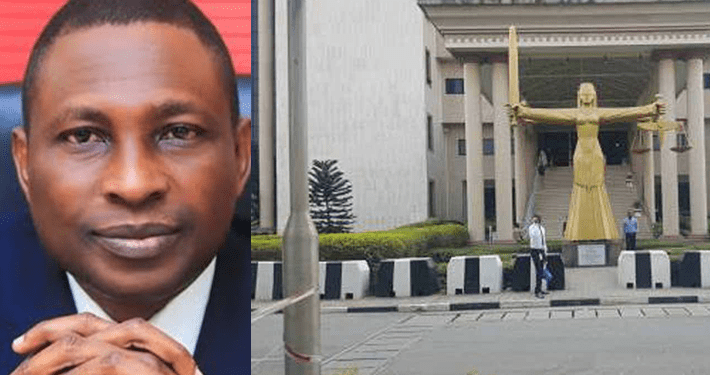The Federal High Court, Abuja Division, has faulted the Economic and Financial Crimes Commission for obtaining a freezing order against Micoz Bluelink Enterprise’s $163,592 domiciled in the United Bank for Africa without concrete evidence.
Justice Emeka Nwite, in a ruling, held that the EFCC had failed to provide evidence that the funds constituted proceeds of fraud or any crime committed either in Nigeria or elsewhere.
Mr Nwite, who agreed with the company’s argument, held that the anti-graft agency bore the burden of proving its case but failed to do so.
The judge consequently set aside the interim order on September 9, 2024, freezing the funds in Micoz Bluelink Enterprise’s account.
The ruling followed an application filed by Akpasi Oziegbe (trading under the name and style of Micoz Bluelink Enterprise) against the court’s freezing order against his bank account.
The enterprise was incorporated by the Corporate Affairs Commission in 2021 to carry on the business of general trading and distribution, haulage, automobiles and spare parts, general merchandise and general contracts.
The EFCC had, in its ex parte motion, prayed for an interim order freezing the company’s bank account.
In its affidavit deposed to by Austin Elem, an investigator with the commission, the officer averred that on July 14, 2022, Micoz Bluelink received an inflow of $163,592 in its account with UBA from the law firm of Steve J. Mandel.
The investigator said that upon receipt of the $163,592 from the law firm, UBA Plc received a SWIFT callback message from CitiBank, New York, where the funds originated.
According to Mr Elem, CitiBank requested that the funds be recalled because the funds were related to “unjust enrichment” and ‘fraudulent transfer,’ prompting UBA Plc to restrict the account.
He further stated that UBA Plc subsequently transferred the funds to a suspense account at their headquarters, leading the applicant to lodge a complaint with the relevant institutions.
As part of its ongoing investigation, the official said the EFCC wrote to the American Embassy, requesting information on the law firm of Steve J. Mandel in New York concerning the funds.
“The American Embassy is yet to respond to the letter,” he averred.
Besides, the EFCC contacted the Federal Bureau of Investigation (FBI) to assist in investigating the allegations of unjust enrichment and fraudulent transfer as alleged.
“The FBI has commenced investigations but is yet to conclude,” Mr Elem said.
The investigator emphasised that it had not been determined if the funds represented payment for miniature artefacts in ceramic form, as claimed by the applicant (company).
“The respondent/applicant has not provided any evidence before this honourable court to show that the funds were for the procurement of miniature artefacts in ceramic form,” he said.
Mr Elem urged the court to uphold the freezing order granted on September 9, 2024, asserting that lifting the order would prejudice the EFCC’s ongoing investigation.
The company, through its lawyers, Ojukwu Chikaosolu and Adeyemo Dolapo Richard, disagreed with the EFCC’s claims. It argued that the commission’s allegations were false and aimed at misleading the court.
In the application, the firm said that the callback request cited by the EFCC merely referenced “unjust enrichment” without providing further clarity.
It argued that the EFCC’s application to freeze the account was made without concrete evidence. It accused the EFCC of fishing for an offence to justify its application to freeze the account.
The company urged the court to set aside the order, stating that maintaining the freezing order without direct and cogent evidence of fraud or crime violated its rights to a fair hearing and property, as protected by law.
Delivering the ruling, Mr Nwite agreed with the applicant’s counsel that, in the absence of any report by the bank indicating criminal evidence, the funds in the applicant’s account were not proceeds of crime.
The judge held that the EFCC “does not have any concrete or reasonable suspicion that an offence was committed by the applicant and merely sought the court’s order to punish the applicant, who, in fact, was the one who lodged the complaint.”
Mr Nwite also observed that the EFCC did not rely on a criminal complaint, court order, charge, or indictment but merely sought to freeze the applicant’s account.
He further held that perpetuating the order would amount to enabling the EFCC to violate the applicant’s rights to a fair hearing. The judge declared that the applicant is constitutionally entitled to access its funds, having not been proven involved in any crime.
Mr Nwite consequently discharged the freezing order.
(NAN)






